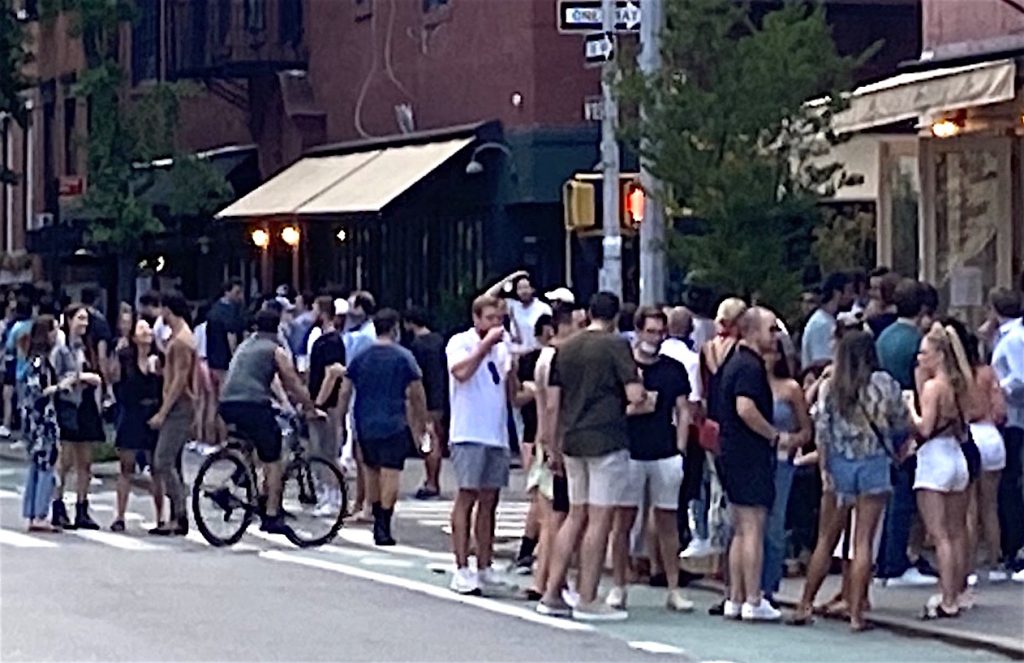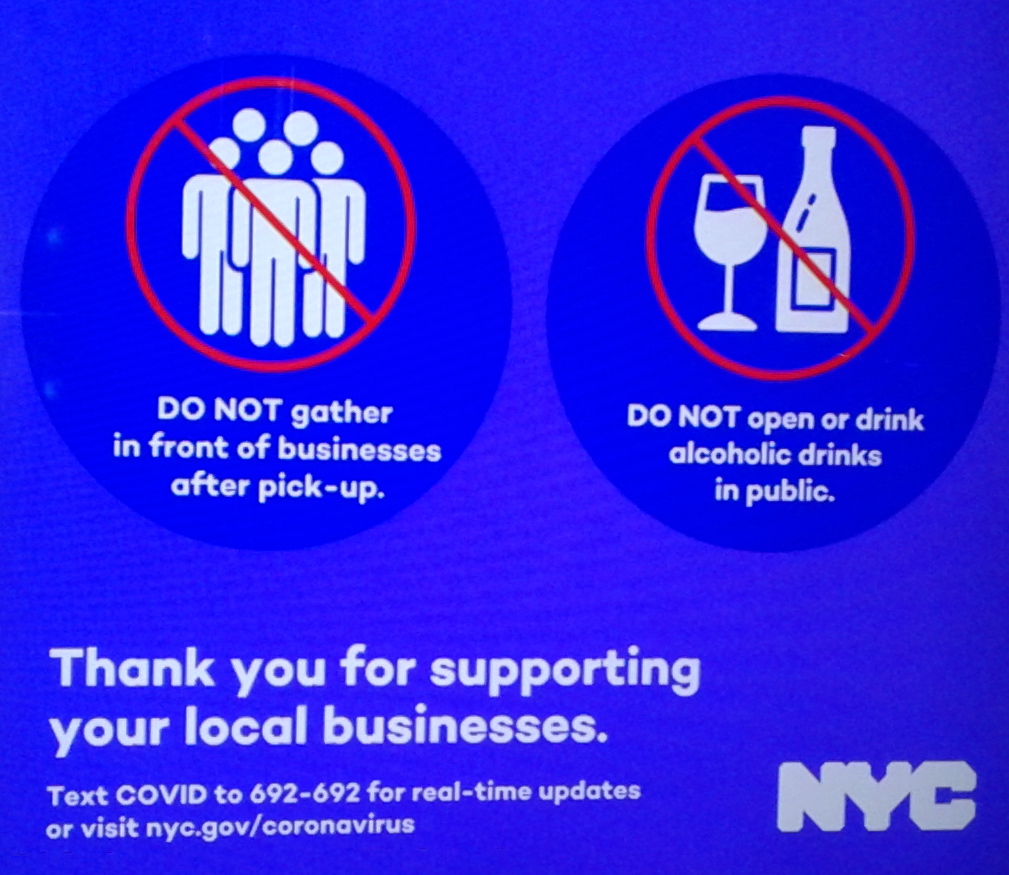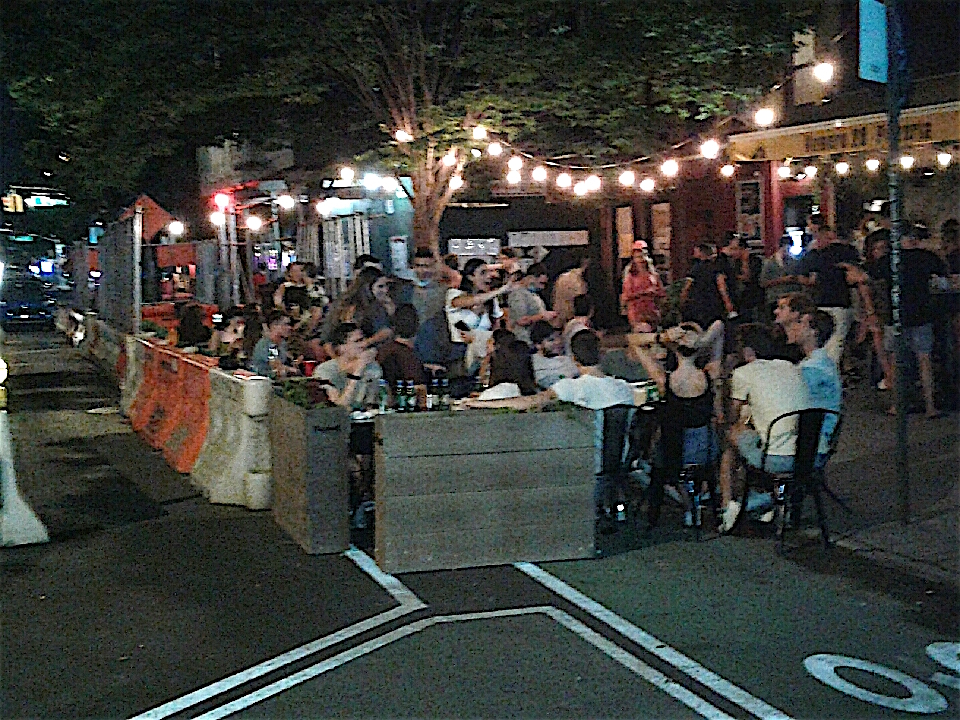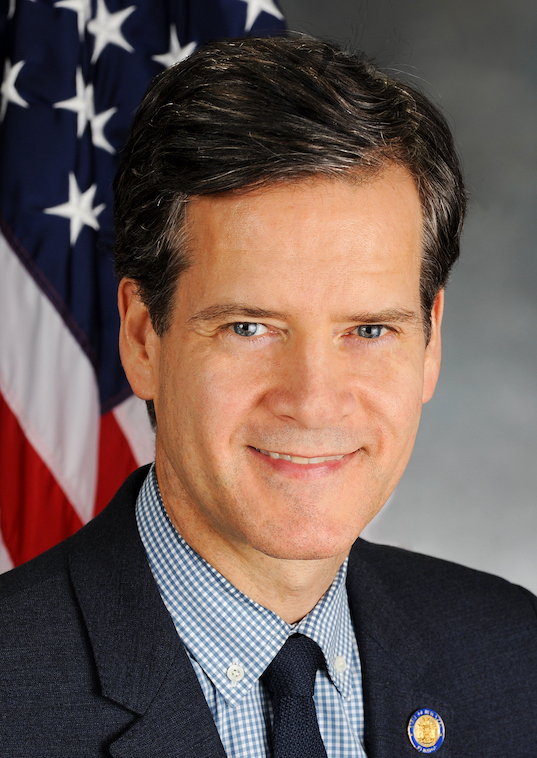BY LINCOLN ANDERSON | Brad Hoylman has put his bill to extend takeout and delivery alcohol for two years “on ice.”
The state senator broke the news to Community Board 2 at its monthly meeting on July 23. He later explained his decision more fully in a phone interview with The Village Sun.
The development comes as a relief to many Downtowners alarmed that takeout alcohol has allowed “pandemic parties” in the streets, creating both a grave health risk and a quality-of-life nightmare.
“I don’t think it would be prudent to proceed with legislation extending the governor’s executive order on ‘to-go’ alcohol,” Hoylman said, “because of the justified public health concerns caused by restaurant and bar patrons congregating on street corners and sporadic and uneven enforcement. Nothing is more important than defeating COVID-19.”
Due to the pandemic emergency, which shuttered New York City bars and restaurants to indoor patrons, Governor Cuomo, in March, issued an executive order allowing these businesses to provide takeout and delivery alcohol. Since then, Cuomo has extended the executive order on a monthly basis. Hoylman’s bill was intended to kick in after the emergency is declared over, and would end the need for the governor to keep extending his executive order.
But speaking on Sunday, Hoylman said right now his bill is on hold.
“It’s effectively tabled,” he told The Village Sun. “I’m not pursing it at this time. It’s not going anywhere.”
The state Legislature was in session last week, but is now out of session again. Even if the body were back in session, though, Hoylman said he feels “it would not be prudent” to try to move the bill for a vote.
And he said he does not foresee any action being taken on the bill before the end of the year.
“I’m not seeking to move it,” he stated of the legislation. “We’ve seen reports that spikes of COVID-19 in other states can be connected to a lack of social distancing and people not wearing face coverings. The bottom line is that I’m not comfortable trying to move a bill like this because of the unknown trajectory of the virus. The feedback that I solicited from local community boards and block associations has been incredibly valuable in helping reach this determination.”
When Hoylman initially introduced his bill, the problem of street-corner drinking parties had not yet exploded on social media and, in turn, in the media.
“We hadn’t seen these congregations in different neighborhoods — Hell’s Kitchen, the East Village, West Village — that are in my district,” he noted.
The governor was so outraged by the mob scenes of drinkers in mid-June, particularly on St. Mark’s Place, that he threatened to put Manhattan back on lockdown. Hoylman, at that time, also angered, said he might pull the bill altogether or only have it apply outside of New York City.
On top of that, though, and even more alarming, has been the spike and resurgence of the virus in much of the rest of America.
“You don’t draft a bill and then put on blinders as the world is changing,” Hoylman reflected. “Look, Florida is as bad as New York ever was — and they believe it’s connected to social gatherings and people not wearing face masks.”

Meanwhile, in New York, “we’re beating the virus, we’re beating it,” Hoylman said, stressing that now is not the time to screw things up and lose the progress that has been made.
In addition to health concerns around to-go booze, Hoylman said he is also aware that local residents have complained about noise associated with it and lack of enforcement of the city’s Open Container Law — which is allowing people to drink outside a la Bourbon St. in New Orleans.
One factor that might prompt action on the bill, however, is a vaccine, the state senator conceded.
“If we have a vaccine in the new year, maybe that’s the trip wire for bills like this to be considered,” Hoylman told The Village Sun.
Asked why takeout alcohol would even be needed anymore if a vaccine became available, he said small businesses would still need the help.
“The idea is that the restaurants are behind and they need this,” he said.
Hoylman emphasized that he’s extremely worried about the survival of local small businesses, many of them historic, some of them more than 100 years old.
“We see the impact on neighborhoods,” he said. “Iconic restaurants, many of them may never reopen.”
He’s personally concerned, for example, about the classic Village haunt the Knickerbocker, a restaurant on his own block in Greenwich Village that he loves.
“We need federal support for small businesses,” the state senator stressed, though adding, “The way things are going in Washington, I don’t know if we’re going to get it in time.”
With Hoylman’s bill “on ice,” C.B. 2, fittingly then, gave it an icy reception at its July 23 full-board meeting. The board — which covers the area west of Bowery/Fourth Ave. between 14th and Canal Sts., including Greenwich Village and Soho — deemed the legislation “too vague” and “an unacceptable risk to public health and safety.”
The board cited multiple problems with takeaway alcohol, including people drinking the booze right outside bars, in violation of New York City’s Open Container Law; patrons congregating in groups without social distancing or wearing face masks; people not buying food — or only a trivial amount — with their drinks, in violation of the governor’s executive order requiring food purchases; and “numerous acts of antisocial and unwelcome behavior (e.g. public urination, the accumulation of trash in public areas, excessive noise, smoking — including the use of marijuana — which can be detected in nearby residences).”
Takeout drinks need to be firmly sealed — and not just that, but also labeled for type of alcohol — the board stressed.
Plus, there currently is no effective “enforcement mechanism,” the board noted — meaning there are not enough State Liquor Authority inspectors to keep watch over the city’s thousands of bars and restaurants and their patrons amid the health crisis.
At its July 23 meeting, C.B. 2 presented its “review and recommendations” on the bill. Because the board technically did not vote on a resolution, it neither denied nor approved the bill per se. Yet, the volunteer board’s feelings about the measure were quite clear from its language.
In short, C.B. 2 said, “The vagueness of Senate Bill 8392, as proposed and written, represents an unacceptable risk with regard to public health and safety at this time.”
The board members said, in order to win their support, the law “should be accompanied by an acceptable mechanism for legal enforcement for open containers of alcoholic beverages…for protecting public safety [and] for protecting the quality of life for existing residents.”

As for specific recommendations, C.B. 2 said takeout booze should be limited to specific hours — certainly not past 11 p.m. — and definitely not, as the bill proposes, allowed to extend to 4 a.m. “for some vendors.” Also, the board said, people should only be allowed to buy one drink at a time.
Meanwhile, the board noted, the response by district residents has been “overwhelmingly against and adamantly opposed to the Senate bill as proposed, while no one appeared [at C.B. 2 meetings] or wrote in its favor.”
Prior to the pandemic, many district residents were already hypervigilant about bars and restaurants’ impact on their quality of life, C.B. 2 noted.
“Many of those living and residing in Community Board 2 [have] already been subject to significant impacts from eating and drinking establishments near their homes over the years, those businesses being primarily reliant upon those living outside the confines of its community to patronize its establishments, including tourists and other visitors coming into the confines of Community Board 2,” the board said.
At the same time, the community board said the scofflaw premises are admittedly “a minority of licensed establishments within the community but nonetheless conspicuous for their actions, greatly affecting those living in our community.”

In addition, the board noted, the Village, Soho and the rest of C.B. 2 feature historic buildings more than 100 years old, many of them located in mixed-use districts — with residential and commercial uses — on narrow streets. These communities were simply not designed to handle the mushrooming of licensed premises — often in close proximity to residential buildings — that has been seen over the past 15 years, in the board’s view.
Plus, there were already issues with the Open Container Law before coronavirus, as well, the board added — the main one being that it’s no longer even being enforced. That’s because the law was found to be racially discriminatory. Drinking in public has been effectively decriminalized, C.B. 2 noted, adding that the mayor, Police Department and Manhattan district attorney have all said the law will not be enforced “except in limited circumstances.”
On the other hand, the alcohol delivery portion of Hoylman’s bill received scant objection from the community.
Hoylman, who formerly chaired Board 2, said he values the board’s input and that its suggestions would be considered if the bill is revived.
He noted that his bill would include input from community boards on the issue of takeout and delivery alcohol — something that does not currently exist under the governor’s executive order — and that this was a reason he drafted it in the first place.
Also on community input, separately, on July 24, a group of nearly 50 Villagers submitted a “memo of opposition” to Assembly Bill A10550, the identical companion bill to Hoylman’s Senate version of the bill.
The memo blasts takeout booze for spawning what it calls “pandemic parties” by “indifferent” twentysomethings. Among its signers are former District Leader Aubrey Lees and longtime West Village activists Zack Winestine and Stuart Waldman.
“As residents of New York City, we see daily the damage ‘takeaway’ drinking has done to our communities: large crowds of unmasked drinkers on our streets during a pandemic,” the memo states.
“The executive order was intended to help hard-hit restaurants by allowing them to sell ‘takeaway’ drinks with food in accordance with municipal open-container ordinances,” the Villagers wrote. “This has not happened. Customers don’t buy food with their ‘takeaway’ drinks and they don’t take them away either. They linger in ‘pandemic parties’ on our sidewalks, on our stoops and even in our doorways — in scenes that have been publicized in newspapers and on television news programs. All of this would continue under A10550.”
Echoing C.B. 2, the locals noted that the S.L.A. lacks the manpower to rein in the outdoor drinking scenes, while the Police Department has said it won’t enforce either the Open Container Law or social-distancing guidelines.
“The outdoor drinking partiers do not wear masks nor do they remain six feet apart,” the Villagers’ memo asserts. “These indifferent young partiers may well be vectors for COVID-19. In just the last week, the City of New York announced that the rate of infection among 20-to-29-year-olds had doubled. Undeterred by any meaningful enforcement, the partiers will continue to spread the virus under A10550.”


Boooooo! We need takeout booze! Make NY New Orleans!